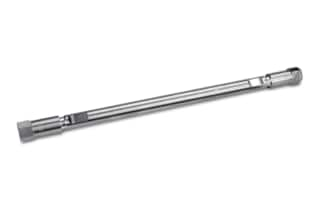
|
Chemistry |
C18 |
|
Separation Mode |
Reversed Phase |
|
Particle Substrate |
Silica |
|
pH Range Min |
2 pH |
|
pH Range Max |
8 pH |
|
Maximum Pressure |
6000 psi (415 Bar) |
|
Endcapped |
Yes |
|
Bonding Technology |
Shield RP18 |
|
Silanol Activity |
Low |
|
Particle Shape |
Spherical |
|
Particle Size |
3.5 µm |
|
Endfitting Type |
Waters |
|
Pore Size |
100 Å |
|
Format |
Column |
|
Surface Area |
335 |
|
System |
HPLC |
|
USP Classification |
L1 |
|
Inner Diameter |
3 mm |
|
Length |
150 mm |
|
Carbon Load |
17 % |
|
UNSPSC |
41115709 |
|
Brand |
Symmetry |
|
Product Type |
Columns |
|
Units per Package |
1 pk |
Symmetry Shield RP18 Column, 100Å, 3.5 µm, 3 mm X 150 mm, 1/pk
The Symmetry Shield RP18 Column is based on Waters' patented embedded polar group technology, which provides a shielding effect for the silica's residual surface silanols from highly basic analytes. Because of the embedded polar group being in close proximity to the silica surface and unique column properties, the activity of surface silanols is drastically reduced and thereby assists in improved peak shape and resolution.
This Symmetry Shield RP18 Column has been carefully designed to provide the narrowest ligand surface coverage (ligand density) in the industry, which enables scientists to achieve outstanding reproducibility through their experiments. Because of the column's excellent operational capacity and minimal shifts in resolutions, it will provide you with increased reproducibility within batch-to-batch and column-to-column.
The Symmetry Shield RP18 Column is an excellent column choice to use in experiments with highly aqueous mobile phases, especially in applications that require low organic mobile phase conditions. The Symmetry Shield RP18 Column is designed to prevent any pore dewetting because the embedded polar group design within the column maintains the wetted-pore surface. Because of these unique properties and design choices, this lab equipment will assist in improving the retention of your analyte and eliminating the requirement of a long re-wetting and column re-equilibration process.
The Symmetry Shield RP18 Column is designed to last a long time and reduce overall lab equipment cost as it offers optimized performance. It combines two main factors that impact the column's lifetime, the hydrolytic stability of the packing material and the mechanical stability of the packed bed.
To review the complete offering from Waters, please browse through our brochure or check out our website to shop for lab equipment so you can replenish your stock and add it to your existing equipment portfolio.
You might also want to check out the Symmetry Shield RP18 VanGuard Cartridge, 100Å, 3.5 µm, 3.9 mm X 5 mm, 3/pk, which is designed to extend the analytical column's lifetime and performance by removing particulate contamination from the mobile phase stream; this cartridge is optimized to protect all 3.9 mm and 4.6 mm I.D. SymmetrySheild RP18 analytical columns containing 3.5 µm sorbent particles.
What Is The Recommended pH Range For The Symmetry Shield Column?
The Symmetry Shield RP18 Column exhibits excellent performance within a pH range of 2 to 8, ensuring reliable operation. However, it is important to consider that extreme conditions such as high pressures, pH values, or temperatures may impact the longevity of the column.